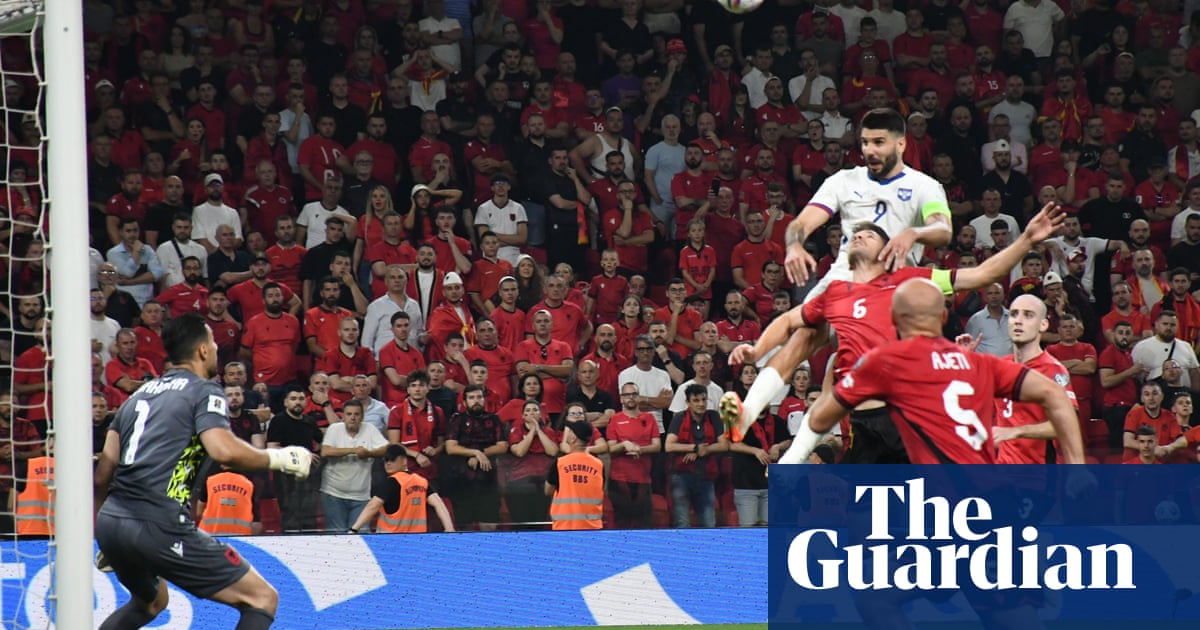Inside Arena Kombëtare, more than 20,000 supporters caught their breaths and trained every last squint of focus on Rey Manaj. Outside, the legions who had flooded into Tirana all day just to be part of things, some queueing at borders before racing to bars and public viewings through the heat, clasped their beers.Albaniahad been awarded a penalty and nobody cared that it was soft; if Manaj kept his nerve then maybe a football hero could finally be born, the accursed feel around this fixture banished at long last.
Manaj straightened up, perhaps a little too much, and approached the ball head on. If he needed any reminder of the context he could always heed the reverberations of “Serbia,Serbia, f*ck your sister” that had formed much of the day’s soundtrack and had only just paused before he stepped up. The shot was low, far too close to Djordje Petrovic and firmly pawed to safety. The half-time whistle sounded immediately, members of Serbia’s delegation making a beeline for the pitch to embrace their keeper. For Manaj, all that lingered was the frozen image of a moment he had failed to meet.
In the end this occasion managed to pass a bigger test, but only by the skin of its teeth and not without probable repercussions. A goalless draw was always likely to keep the peace and, given these sides’ catastrophic meeting in Belgradealmost 11 years ago, the real measure of success was in its smooth completion. There were no drone-shaped holes in a rigorous security project; no battles raging into the small hours of what had been a close, sweltering, febrile night. Nobody could boast of having turned proceedings upside down, on or off the field.
Nonetheless Uefa’s match delegate, the Swiss former police chief Jacques Antenen, will have had enough to occupy his thoughts as he made his way through the stand half an hour after full time before sitting inside to debrief with colleagues from Fifa. Antenen was selected specially for his weight in dealing with high-risk events and his in-tray looked certain to bulge when, in the 65th minute, the referee Davide Massa called a pause for the third time.
Objects had periodically rained down on Serbia’s players from the venue’s east stand, leading the public address announcer to plead for calm when Sasa Lukic was struck upon preparing to take an early corner. Shortly before the hour Strahinja Erakovic was struck near the far touchline, a similar entreaty ensuing; when Andrija Zivkovic felt a similar impact soon afterwards the warning signs could hardly have been clearer.
Massa appeared twice to gesture for the teams to depart, but settled for a lengthy conversation with both sets of players after corralling them towards the centre circle. It ended with Berat Djimsiti, the Albania captain, approaching the offending section of fans. Police quickly moved in to deter future missile throwers and the final half-hour’s play passed peacefully enough. Ultimately, Massa should be commended for mastering an unacceptable situation and perhaps recognising that taking the most drastic step may have had the effect of escalating it.
So an uneasy peace rumbles on until the countries meet again in October, when Serbia will be tasked with keeping their own rogue elements in check. There was no mistaking the tone on a walk towards the ground along Bulevardi Deshmoret e Kombit in the hours before kick-off. Albania and Serbia will co-host the Uefa Under-21 championship in 2027 but local ultras do not share the perspective of the diplomats behind that scheme.
“Old enemies do not become new friends,” read a large flag displayed atop the Pyramid of Tirana, bearing the image of prominent Albanian resistance leader Elez Isufi. Fans scaled more than 100 steps to join the spectacle; youths on bicycles set off red smoke flares down below. Across the road members of Tifozat Kuq e Zi, the influential group effectively barred from this game after being denied their usual ticket allocation, prepared to march with a banner taking aim at Albania’s football association.
Sign up toFootball Daily
Kick off your evenings with the Guardian's take on the world of football
after newsletter promotion
Their message was clear: “Take away our tickets, bring the police in front of us, you can’t kill the heart that beats for Albania.” Inside the stadium those who had got lucky in the ballot, or in some cases paid four-figure sums on the black market, did their best to set blood pumping. It did not resemble a corporate-addled atmosphere when Serbia warmed up to deafening whistles and invective. Those continued throughout their national anthem, when local mascots accompanying Lazar Samardzic and Aleksandar Mitrovic showed cameras the “eagle” sign that has given football’s governing bodies plenty of homework at recent tournaments.
A predictably fraught match offered little suggestion either side can threaten England at the top of Group K. Serbia’s technical supremacy was rarely matched by attacking thrust although it took a stupendous save from Thomas Strakosha to claw away Mitrovic’s textbook header after the interval. Mitrovic missed another chance but it was Albania, roared forward with the slightest encouragement but short on quality, who should have won. Manaj had passed up on his shot at immortality but Nedim Bajrami should have rendered that a distant memory when offered a clear opportunity to put things right. His tame effort gave Petrovic no trouble and was, overall, of a piece with the affair.
“We deserved more, but this is football,” said the Albania manager Sylvinho. Such bromides will do little to console Manaj. But perhaps the fact sport could just about dictate the post-match discussion points to a better way forward for friends and enemies alike.
